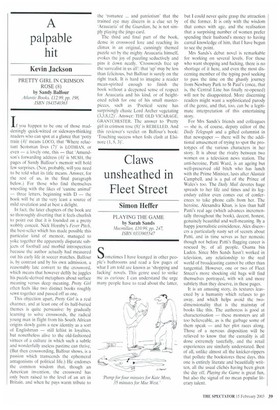A palpable hit
Kevin Jackson
PRETTY GIRL IN CRIMSON ROSE (8) by Sandy Balfour Atlantic Books. £1299, pp. 198, ISBN 1843540363 If you happen to be one of those maddeningly quick-witted or sideways-thinking readers who can spot at a glance that 'potty train (4)" means LOCO, that 'Where reluctant Scotsman lives (7)' is LOTHIAN, or even — a lovely one, this — that 'Amundson's forwarding address (4)' is MUSH, the pages of Sandy Balfour's memoir will hold few surprises. (Nor, probably, will you need to be told what its title means. Answer, for the rest of us, in the final paragraph below.) For those who find themselves wrestling with the likes of 'canine animal' — three letters, beginning with D — the book will be at the very least a source of mild revelation and at best a delight.
In fact, the later chapters of the book are so thoroughly diverting that it feels churlish to point out that it is founded on a pretty wobbly conceit. Nick Hornby's Fever Pitch, the best-seller which has made possible this particular kind of memoir, managed to yoke together the apparently disparate subjects of football and morbid introspection because the author actually had measured out his early life in soccer matches. Balfour is, by contrast and by his own admission, a reasonably late convert to the crossword, which means that however deftly he juggles his puzzle-derived metaphors about surface meaning versus deep meaning. Pretty Girl often feels like two distinct books roughly sewn together and passed off as one.
This objection apart, Pretty Girl is a real charmer, and at least one of its half-buried themes is quite persuasive: by gradually learning to solve crosswords, the radical young man in flight from his South African origins slowly gains a new identity as a sort of Englishman — still leftist in loyalties, but nonetheless alive to the old-fashioned virtues of a culture in which such a subtle and wonderfully useless pastime can thrive. (But then crosswording, Balfour shows, is a passion which transcends the ephemeral antagonisms of political life.) He endorses the common wisdom that, though an American invention, the crossword has only been raised to the level of an art in Britain, and when he pays warm tribute to the 'romance and patriotism' that the trained eye may discern in a clue set by 'Araucaria' of the Guardian, he is not simply playing the jingo card.
The third and final part of the book, dense in crossword lore and reaching its climax in an original, cunningly themed puzzle set by the mighty Araucaria himself, evokes the joy of puzzling seductively and pins it down neatly. 'Crosswords free up the surrealist in us all': that 'up' may be less than felicitous, but Balfour is surely on the right track. It is hard to imagine a reader mean-spirited enough to finish the book without a deepened sense of respect for Araucaria and his kind, or of heightened relish for one of his small masterpieces, such as 'Poetical scene has surprisingly chaste Lord Archer vegetating (3,3,8,12)'. Answer: THE OLD VICARAGE, GRANTCHESTER. The answer to 'Pretty girl in crimson rose (8)' is REBELLED. And this reviewer's verdict on Balfour's book: 'Touching success when foils clash at Elsinore (1, 8, 3)'.


































































 Previous page
Previous page